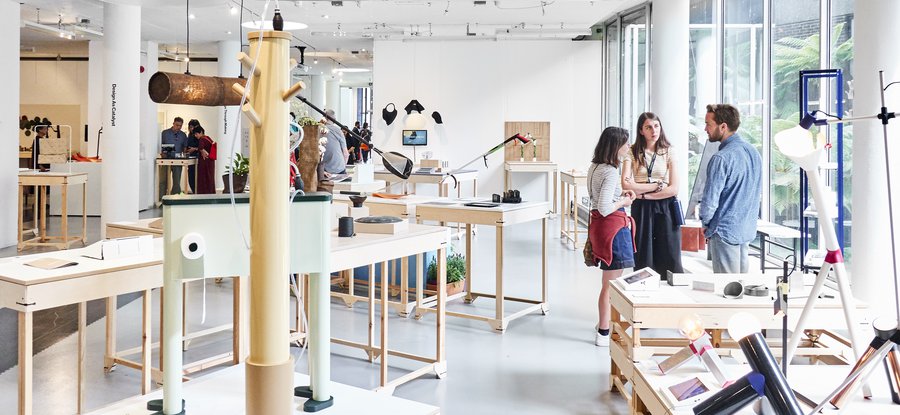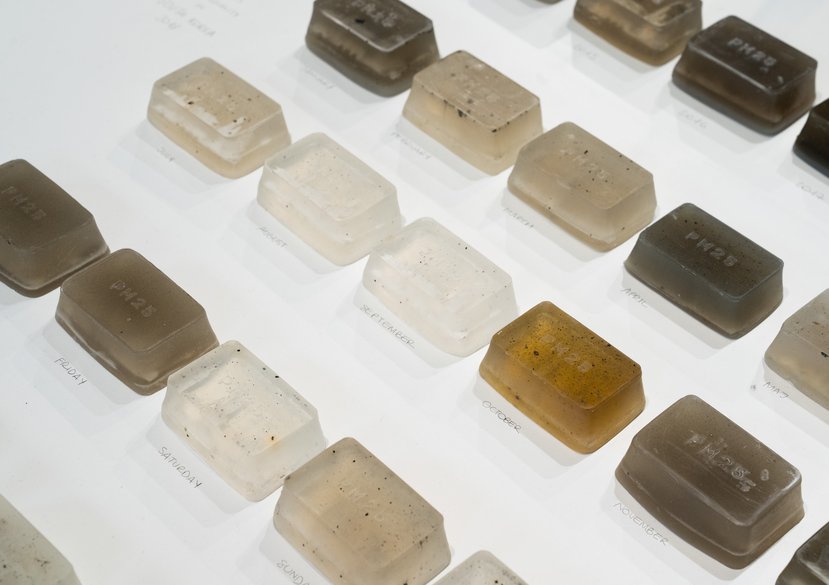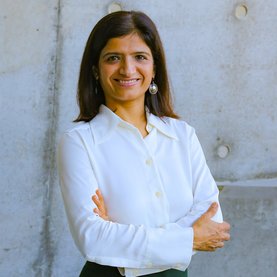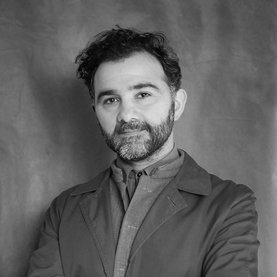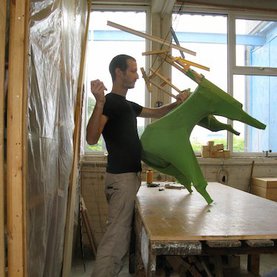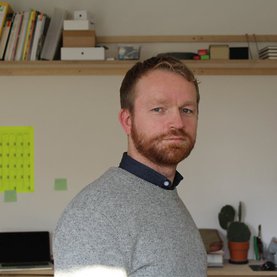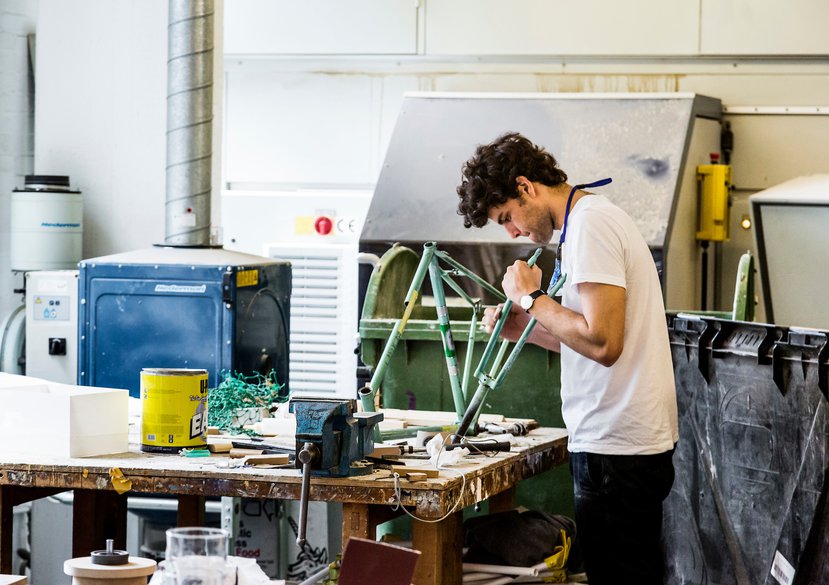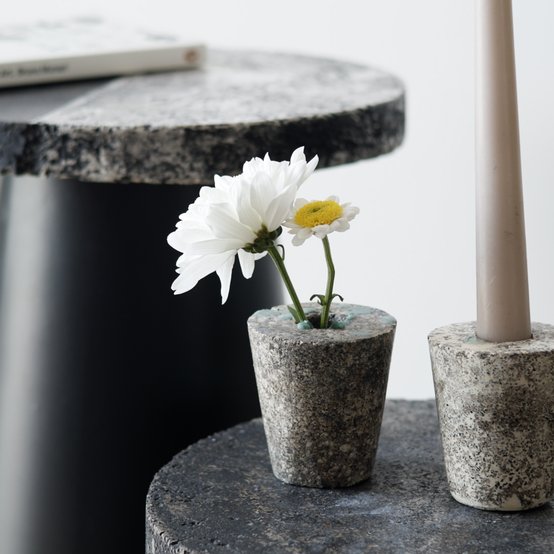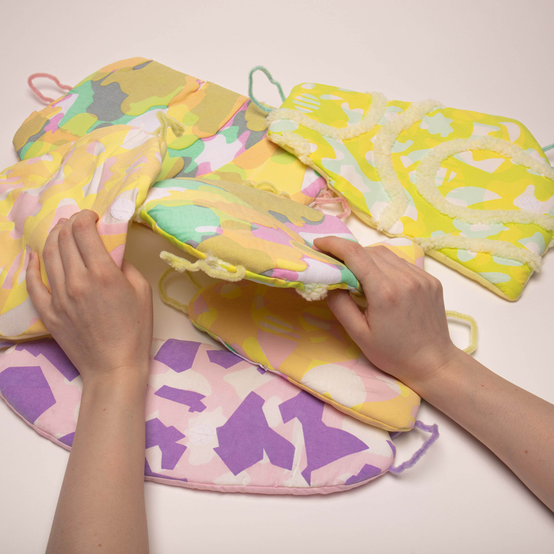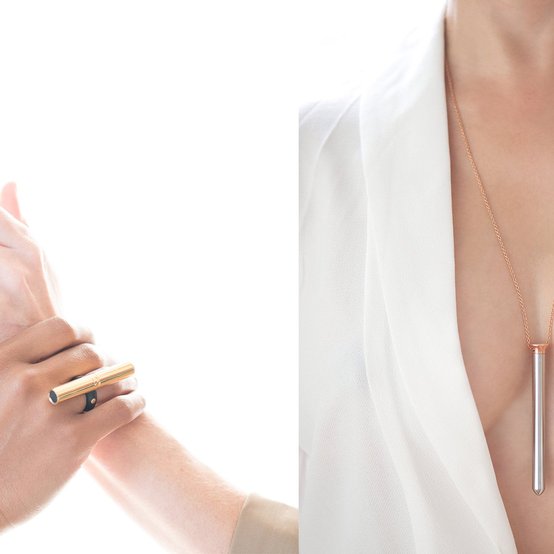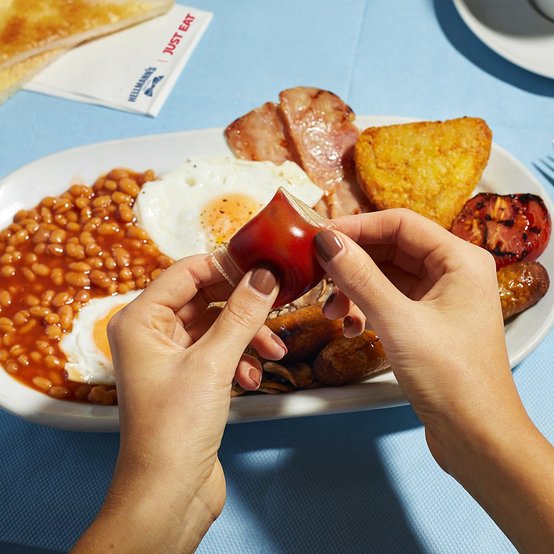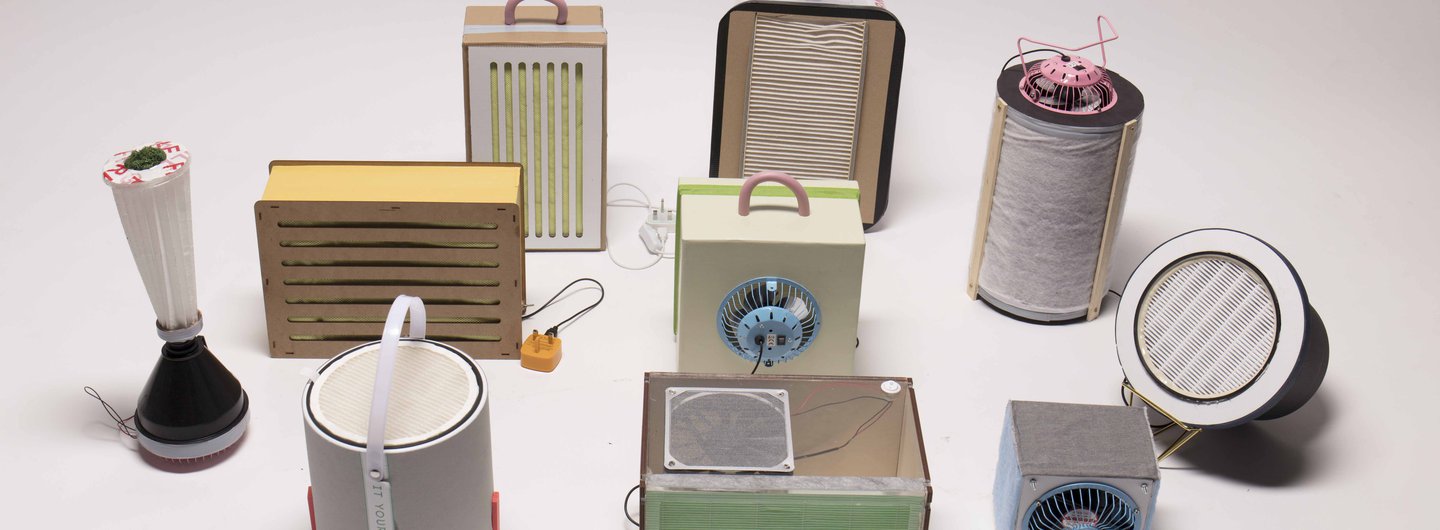
Overview
Developing design discourse
Key details
- 180 credits
- 1 year programme
- Full-time study
School or Centre
Location
- Battersea
Next open event
Application deadline
- 14 Aug 2024
Career opportunities
- Graduates are creative catalysts and visionaries who go on to lead in design consultancies, join large established companies, and to set up their own design studios and start-ups. Our graduates are change makers driven by their vision of tackling and redefining industries.
Responding to and creating design discourses.
Design Products explores new terrain for designing products. aiming to evolve new design disciplines and practices. We actively challenge and critique the current concepts and assumptions around 'products'. Join us to develop cutting-edge creative practice for designing better futures. You'll take various approaches throughout your studies, including design subtraction, multi-species design, circularity, questions for action, products delimited, design doing, design justice and decolonising design. We anticipate that these areas will evolve and adapt year-to-year.
We work in collaboration with industry, whilst also exploring new locations and relationships for designing products, from design interventions to working with start-ups, governments or global agencies. We measure the success of our design impacts against the United Nations Sustainability Development Goal’s and the design territory of products within systems.
Applications for the September 2024 intake are open and will be assessed on a rolling basis. Programmes will close for applications when the maximum number of places have been awarded, or at the final deadline on 14 August, 12noon (UK time).
Explore graduate work
In July 2023, students presented RCA2023, a series of exhibitions and events. Explore online at the RCA2023 website.
You can also view previous events and exhibitions online at Showcase.
Find out more about this programme
Catch the replays from our latest online Open Day.
Gallery
Staff
Facilities
The School of Design is based across our Battersea and Kensington sites.
View all facilitiesStudents have access to the College’s workshops, with traditional facilities for woodworking, metalworking, plastics and resins, including bookable bench spaces. Computer-driven subtractive milling equipment is available, as well as additive rapid prototyping.
Our alumni
Our alumni form an international network of creative individuals who have shaped and continue to shape the world. Click on each name to find out more.
Where will the RCA take you?More details on what you'll study.
Find out what you'll cover in this programme.
What you'll cover
How will I learn?
There will be several opportunities to collaborate with others, but at a minimum, your programme will include 259 contact hours and 1691 independent study hours. Contact hours can consist of lectures, seminars, tutorials, critical forums and workshops, among other types of teaching delivery.
Your programme's teaching types include briefings, projects, tutorials, seminars, lectures, critical forums, technical inductions, workshops, offsite visits and blended learning. You can find an overview of teaching types on our Offer Holder Hub.
Programme structure
The programme is delivered across three terms and includes a combination of programme, School and College units. Learning will develop during the programme through terms 1 and 2 via a series of short projects focusing on experimentation and developing a strong and adaptive personal creative process, building a portfolio of projects culminating in the independent research project in term 3.
Term 1
In the first term, we help you locate your own practice at the forefront of the design products landscape in the unit Locating Practice (15 credits). This is supported by enhancing research skills and identifying additional technical and intellectual skills to develop new and improved design methods and approaches connecting research and making.
Experimental Design (30 credits) allows you to expand the range and ambition of your design practice through various forms of experimentation to uncover new skills, methods and ideas. This unit covers a broad spectrum of experimentation from methods to materials, technology, making, manufacturing, futures, social and participatory.
Across Terms 1 and 2, you will participate in AcrossRCA (30 credits), the College-wide unit. See below for more details.
Term 2
The second term engages with Advanced Practice (15 credits) by deepening your own creative methods through specialist focus via elective programme platform options based on programme ethos themes and School-wide electives. Programme specialist design input is delivered via platform electives in the Advanced Practice unit.
You will also collaborate with other School of Design programme disciplines in a team-based School-wide Grand Challenge (15 credits), tackling a major emerging strategic design issue. There are also opportunities to take part in commercially sponsored projects in terms 2 and 3, depending on availability.
Term 3
In the third term, you will demonstrate that you can draw together learning from terms 1 and 2 by independently developing, managing and delivering a high-resolution advanced Design Products project (Independent Research Project). The emphasis here is showing how you have brought together skills, learning and design practices from across terms 1 and 2 to design and deliver a project that sits at the forefront of the design products landscape and enables the delivery of a design discourse that argues for the new design space within which it sits.
The Independent Research Project (60 cerdits) will be delivered through a supervision model, and you are expected to spend most of your time on personal study and making. We anticipate that you will be able to complete term 3 remotely or in your own studio/employment/placement/designer in residence, subject to a satisfactory IRP proposal agreed in advance.
AcrossRCA
AcrossRCA is a compulsory 30-credit unit which is delivered as part of all MA programmes.
Situated at the core of your RCA experience, this ambitious interdisciplinary College-wide unit supports you in responding to the challenges of complex, uncertain and changing physical and digital worlds. Developed in response to student feedback, AcrossRCA creates an exciting opportunity for you to collaborate meaningfully across programmes.
Challenging you to use your imagination and intellect to respond to urgent contemporary themes, this ambitious unit will provide you with the opportunity to:
- make connections across disciplines
- think critically about your creative practice
- develop creative networks within and beyond the College
- generate innovative responses to complex problems
- reflect on how to propose ideas for positive change in local and/or global contexts
AcrossRCA launches with a series of presentations and panel discussions from acclaimed speakers who will introduce the themes and act as inspirational starting points for your collaborative team response.
Delivered online and in-person across two terms, the unit has been designed to complement your disciplinary studies and to provide you with a platform to thrive beyond graduation.
Requirements
What you need to know before you apply
Candidates are selected entirely on merit and applications are welcomed from all over the world. The selection process considers creativity, imagination and innovation as demonstrated in your portfolio, as well as your potential to benefit from the programme and to achieve high MA standards overall.
For MA Design Products, you should have a good undergraduate degree or equivalent in an area of design, or related background and proficient written and spoken English. Several years of professional experience, either before or after a first degree, is a benefit, and you must be able to demonstrate critical and innovative thinking, a design curiosity and the ability to thrive in student led projects.
Applications are welcomed from candidates from related backgrounds, such as engineering, architecture, communication, sports science, medical/health, international development/NGO, economics/business, material science, technology development and user experience.
What's needed from you
Portfolio requirements
We are looking for people from all backgrounds who are interested in using design to solve problems and enrich lives. Use your portfolio to highlight your work and skills. We especially want to understand your thinking process, how to you frame problems and tackle them, how you measure success and learn from challenges.
1) Portfolio (required)
We want to see the depth and quality of your work, especially your approach to design work, interests, and ambitions.
Pick your best projects to include that highlight your technical skills and design thinking process.
- Communicate the story of each project: the motivations, specific design problems, how you solved them, what you learned through testing/iteration
- Highlight challenges or failures and how they were addressed
- Works in progress may be included
- Works that has been deployed in public (to real-world/places/people) is especially valuable
- Clearly identify your role and specific contributions when including group projects
- Any kind of project is acceptable. Even from a non 'design' field, tell us about it as outlined above
2) Research/Project agenda (required)
Tell us about your specific research plans. What is your area of interest within the field of design and what types of problems do you want to pursue while in the programme?
It should be:
- 600–800 words, submitted in pdf format
- Propose a research question that you are interested in exploring through the Design Products programme
- Define your motivation and the significance (i.e., what is the potential benefit) of the problem you would like to investigate
- Provide some referenced background describing how the problem is grounded in the field of design (i.e., what has been done in the past and why the issue you are interested in currently exists)
3) Your Interests (optional)
Tell us about any other interests or activities you take part in: anything else that informs your interests, how you view the world, and helps to enrich your process and learning.
Do you:
- work in a lab, maker space, or participate in a technical club/group?
- collect interesting things?
- travel extensively?
- regularly visit exhibitions/museums?
Video requirements
You must submit a video of no more than two minutes as part of the application process.
We would like you to pick a ‘designed work’ and create a video reflecting on:
- how was it successful or influential
- what are the positive and negative attributes about how it was used/applied
- how would you improve or re-do the design if you could
This can be an example of your own work or something in the public domain. Use this to articulate your view on the role that design can play in impacting the world
English-language requirements
If you are not a national of a majority English-speaking country you will need the equivalent of an IELTS Academic or UKVI score of 6.5 with a 6.0 in the Test of Written English (TWE) and at least 5.5 in other skills. Students achieving a grade of at least 6.0, with a grade of 5.5 in the Test of Written English, may be eligible to take the College’s English for Academic Purposes course to enable them to reach the required standard.
You are exempt from this requirement if you have received a 2.1 degree or above from a university in a majority English-speaking nation within the last two years.
If you need a Student Visa to study at the RCA, you will also need to meet the Home Office’s minimum requirements for entry clearance.
Fees & funding
For this programme
Fees for new students
Fees for September 2024 entry on this programme are outlined below. From 2021 onward, EU students are classified as Overseas for tuition fee purposes.
Home
Overseas and EU
Deposit
New entrants to the College will be required to pay a non-refundable deposit in order to secure their place. This will be offset against the tuition fees.
Home
Overseas and EU
Progression discount
For alumni and students who have completed an RCA Graduate Diploma and progress onto an RCA Master's programme – MA, MA/MSc, MFA, MDes, MArch, MEd or MRes – within 10 years, a progression discount of £1,000 is available.
* Total cost is based on the assumption that the programme is completed in the timeframe stated in the programme details. Additional study time may incur additional charges.
Scholarships
Scholarships
Scholarships are awarded for a specific programme and entry point and cannot be deferred without consent from the academic Programme and scholarships panel.
The Deputy Vice-Chancellor’s International Scholarship
For: All MA programmes, MArch, MFA, MDes, MRes & MEd
Eligibility criteria: Students from Australia, Bangladesh, Canada, Colombia, Cyprus, Egypt, France, Germany, Greece, Hong Kong, India, Indonesia, Ireland, Israel, Italy, Japan, Lebanon, Malaysia, Mexico, Nigeria, Pakistan, Poland, Portugal, Saudi Arabia, Singapore, South Korea, Spain, Sri Lanka, Switzerland, Taiwan, Thailand, Turkey, UAE, USA
Eligible fee status: Overseas fee status
Value: £7,000 towards fees
The Deputy Vice Chancellor’s EU Scholarship
For: All MA programmes, MArch, MFA, MDes, MRes & MEd
Eligibility criteria: Students from Austria, Belgium, Bulgaria, Croatia, Cyprus, Czech Republic, Denmark, Estonia, Finland, France, Germany, Greece, Hungary, Iceland, Italy, Latvia, Liechtenstein, Lithuania, Luxembourg, Malta, Netherlands, Norway, Poland, Portugal, Romania, Slovakia, Slovenia, Spain, Sweden, Switzerland, Turkey
Eligible fee status: Overseas fee status
Value: £7,000 towards fees
The Deputy Vice Chancellor’s UK Scholarship
For: All MA programmes, MArch, MFA, MDes, MRes & MEd
Eligible fee status: Home fee status
Value: £5,000 towards fees
Eranda Rothschild Scholarship
For: MA Architecture, MA Writing, MA Animation, MA Design Products
Eligible fee status: Home fee status
Value: Full fees & maintenance
House of Fraser Bursary
For: Any MA programme
Eligible fee status: Home fee status
Value: £10,000 towards fees
The RCA UK Disabled Students’ Scholarship
For: All MA programmes, MArch, MFA, MDes, MRes & MEd
Eligibility criteria: Students who identify as D/deaf or disabled
Eligible fee status: Home fee status
Value: £6,000 for living costs
Sir Frank Bowling Scholarships
For: All programmes excluding PhD & short courses
Eligibility criteria: Black or Black British Caribbean, Black or Black British African, Other Black Background, Mixed - White and Black Caribbean, Mixed - White and Black African
Eligible fee status: Home fee status
Value: Full fees & maintenance
The Vice-Chancellor’s UK Cost of Living Scholarship
For: All MA programmes, MArch, MFA, MDes, MRes & MEd
Eligible fee status: Home fee status
Value: £5,000 for living costs
Logitech Diversity Scholarship in Art and Design
For: MA Design Products, MA Fashion, MA Service Design, MA Textiles, MA/MSc Innovation Design Engineering
Eligibility criteria: Students from under-represented communities
Eligible fee status: Home & Overseas fee status
Value: Full fees
LoveFrom, Scholarship
For: Preference MA Design Products
Eligible fee status: Home
Value: £30,000. Full Tuition Fee & Maintenance
Applying for a scholarship
You must hold an offer to study on an RCA programme in order to make a scholarship application in Spring 2024. A selection of RCA merit scholarships will also be awarded with programme offers.
We strongly recommend that you apply for your programme as early as possible to stand the best chance of receiving a scholarship. You do not apply directly for individual awards; instead, you will be invited to apply once you have received an offer.
More information
Additional fees
In addition to your programme fees, please be aware that you may incur other additional costs associated with your study during your time at RCA. Additional costs can include purchases and services (without limitation): costs related to the purchase of books, paints, textiles, wood, metal, plastics and/or other materials in connection with your programme, services related to the use of printing and photocopying, lasercutting, 3D printing and CNC. Costs related to attending compulsory field trips, joining student and sport societies, and your Convocation (graduation) ceremony.
If you wish to find out more about what type of additional costs you may incur while studying on your programme, please contact the Head of your Programme to discuss or ask at an online or in person Open Day.
We provide the RCASHOP online, and at our Kensington and Battersea Campuses – this is open to students and staff of the Royal College of Art only to provide paid for materials to support your studies.
We also provide support to our students who require financial assistance whilst studying, including a dedicated Materials Fund.
External funding
There are many funding sources, with some students securing scholarships and others saving money from working. It is impossible to list all the potential funding sources; however, the following information could be useful.
Payments
Tuition fees are due on the first day of the academic year and students are sent an invoice prior to beginning their studies. Payments can be made in advance, on registration or in two instalments.
Start your application
Change your life and be here in 2024. Applications now open.
The Royal College of Art welcomes applicants from all over the world.
Before you begin
Make sure you've read and understood the entrance requirements and key dates
More information about eligibility and key datesCheck you have all the information you need to apply.
Read our application process guideConsider attending an Open Day, or one of our portfolio or application advice sessions
See upcoming sessionsPlease note, all applications must be submitted by 12 noon on the given deadline.
Ask a question
Get in touch if you’d like to find out more or have any questions.

